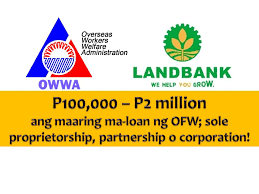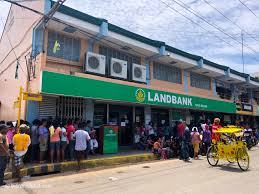

Every year, an average of about US$30 billion or about 150 trillion Philippine pesos are sent home every year by over 10 million overseas Filipinos (OFs). But despite their massive contribution, most OFs are deprived access to government credit or financing for use in setting up livelihood projects back home.
While government livelihood financing and reintegration programs are set up, particularly those administered by the Land Bank of the Philippines (LBP) and the Development Bank of the Philippines (DBP), they are mostly for show more than anything else. They screen out most returning OFs or those still at work overseas, making these programs non-inclusive and mainly exclusive to those with ongoing businesses, especially those with a profit track record of at least three years. This is especially so with LBP which operates more like a commercial bank, not a government institution tasked with a mission to assist needy segments of society, including returning OFs or overseas Filipino workers (OFWs) and the impoverished agricultural sector which badly needs new participants or farmers, as well as work capital.
This author should know. I dealt with LBP officials at its head and provincial offices and the message remains unchanged — WE DON’T CARE IF YOU’RE A RETURNING OF OR OFW KEEN TO GO INTO AGRIBUSINESS. IF YOU’RE NOT A FARMER, YOU CAN’T GET ANY ALEF LOAN. THIS IS THE GUIDELINE. PERIOD, GOODBYE.
OH! YOUR BUSINESS IS A START-UP? YOUR BUSINESS HAS NO RECORD OF PROFITS FOR AT LEAST THREE YEARS? SORRY, DON’T BOTHER US!
Since Land Bank is the government’s principal conduit or vehicle for extending out agricultural and agribusiness loans, how will this bank’s non-exclusive and highly restrictive lending policy affect the country’s agricultural sector and overall food production and food security? Most probably, severely, like an intensity-10-like impact.
Why so? It won’t take rocket science or Artificial Intelligence to deduce the severity or seriousness of the impact. All it takes is simple common sense.
Between 2010 and 2017, the number of Filipinos engaged in agriculture plunged by 25 percent to 9.07 million in 2017 from 12.25 million in 2010, the National Economic Development Authority (NEDA), the country’s premier policy-making body, said in November. Making matters worse for the beleaguered agriculture sector is the Rice Tariffication Law. More and more rice farmers are reportedly abandoning agriculture as they incur losses as a result of the adverse impact of the new law, widely attributed to Senator Cynthia Villa, whose real estate empire allegedly benefits from the conversion of agricultural land for housing.
As farmers abandon agriculture and as more and more agricultural land are lost to housing and other non-agriculture uses, food production across the country is widely expected to go down further. The likely results are predictable and catastrophic. As food production and supply go down while population size continues to rise, demand is likely to outstrip supply more and more. What follows is probably unabated escalation of prices of basic and non-basic food items, thereby inflicting more hardships, especially to the poorest of the poor.
As conditions in the agricultural sector turn from bad to worse, where are Land Bank and its senior officers? Up there in their ivory tower, counting billions of pesos in net income or profits. From January to June 2019, Land Bank reported a net income of P10.58 billion, a 36 percent jump from P7.79 billion during the first half of 2018.
Most of the profits came from loans. What this implies or means is LBP won’t just extend loans to just about anyone or everyone — unless it is almost 110 or 150 percent assured to get back with a profit whatever monies it is lending out.
So what are the chances of returning OFWs or those who have already returned home for good to get loans from LBP for use in setting up livelihood projects? Virtually zero or even negative 50 percent since LBP is operated more as a commercial and profit-driven bank, not a government institution with an enlightened mandate to help the agricultural sector and those keen to pitch in in the country’s economic development.
There were about 10.2 million overseas Filipinos in 2013, according to the Commission on Filipinos Overseas (CFO), an office under the Office of the President. Even if just a tiny 1 percent of this number decides to go into agriculture upon their return to the country, this would mean 102,000 new farmers or agribusiness entrepreneurs in the countryside. Most likely, 102,000 new farmers or agribusiness entrepreneurs can potentially provide a significant or strong push to the agricultural sector and the country’s food production — if given a chance or assistance by the LBP to go into agribusiness.
This is especially so since many overseas Filipinos have sound education and are capable of easily absorbing knowledge on some of the best business practices abroad and even technical and entrepreneurial know-how which can help the country’s agribusiness sector in meaningful and significant ways.
Unfortunately for overseas Filipinos or OFWs, LBP officers do not seem to take a holistic, enlightened and broad view of Philippine macro economy as they are more engrossed in the bank’s bottomline or to amass more and more profits — even at the expense of its principal mandate to bolster the agricultural sector and other national development goals.
In the meantime, overseas Filipinos have little choice but take with a grain of salt, if not dismiss outright, senior officials who, from time to time, pay tribute — NO, PAY MEANINGLESS AND INSINCERE LIP SERVICE — to overseas Pinoys as modern-day heroes for pumping tens of billions of US dollars into the country’s economy every year. Even if this costs continuing sexual, physical and psychological abuses and other atrocities — even deaths — to Filipino women across the Middle East and in a few other places, like Malaysia.
UP NEXT . . . WHAT LAND BANK CAN DO TO BE MORE RESPONSIVE AND HELPFUL TO OVERSEAS FILIPINOS
NOTE: This writer can be reached via jchk94@yahoo.com or his YouTube channel — Juanito Concepcion — https://www.youtube.com/watch?v=2TpwmU7sid0